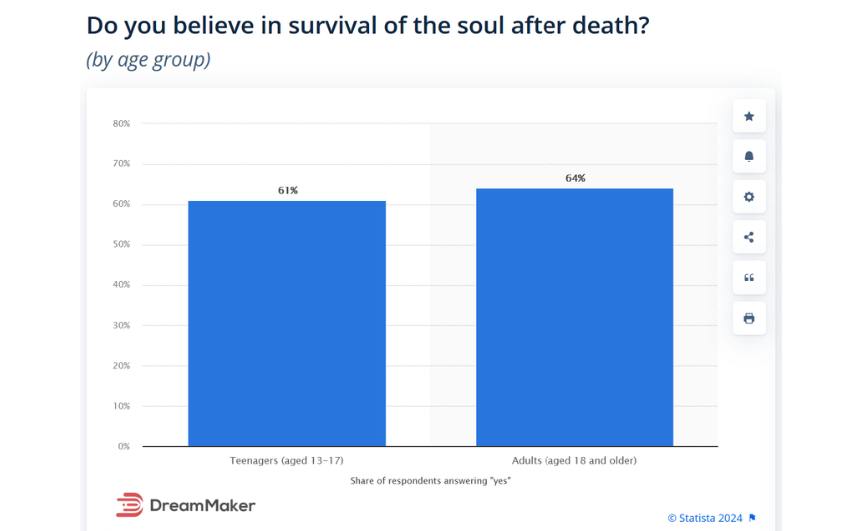On this page

6 Spirituality Statistics, Facts and Trends in 2024
Did you know that most people who identify as spiritual also believe in the existence of God? Or that a vast number of them have a daily spiritual practice?
Spirituality statistics like these may surprise many people.
However, they only serve to underscore the importance and widespread appeal of spirituality.
So, what else do we know about spirituality and its current trends?
Keep reading about spirituality statistics to find out!
Key Spirituality Statistics

- In recent times, there has been a rise in the number of people who identify as spiritual, but not religious.
- Women are more likely than men to identify as spiritual, with 57% of women describing themselves as spiritual compared to 43% of men.
- 60% of Americans consider themselves spiritual but not religious.
- 70% of Americans were more likely to turn to spirituality during stress or adversity.
- 70% of people who identify as spiritual do not attend religious services regularly.
- 73% of people who identify as spiritual believe in an afterlife, while only 18% of non-spiritual people say that they do.
- 64% of American adults believe that the soul lives on after the passing of the body.
6 Engaging Spirituality Statistics That You Need To Know About

1. The percentage of individuals who identify as spiritual
In recent years, there exists a growing interest in spirituality. More and more people seek opportunities to connect with a higher power or explore their belief systems. This trend is reflected in the increased percentage of people who identify as spiritual but not religious.
- A study found that nearly 25% of Americans now consider themselves spiritual but not religious, up from 6% since 2009.
- Several factors may be driving this shift, including a desire for a more personal approach to faith.
- The negative associations that some people have with organized religion and the rise of the “nones”. Which is a term used to describe people who don’t identify with any particular religion.
Whatever the reasons, it’s clear that spirituality is becoming an important part of American life.
2. Popular spirituality associated activities statistics
According to a survey conducted in 2019 almost half of Americans participate in religious practices outside of church or synagogue settings. These practices include meditation, prayer and yoga.
- The survey found that spending time, in nature was the activity among respondents, mentioned by 41% of those surveyed.
- Other popular activities included attending services reading texts and going on spiritual retreats.
- Additionally the survey found that 70% of Americans were more inclined to turn to spirituality when facing stress or adversity.
For individuals spirituality offers a sense of tranquility and connection that can be challenging to find in the paced nature of everyday life. Given the challenges it is expected that interest, in spirituality will continue to grow.
3. A recent study found that 70% of people who identify as spiritual do not attend religious services regularly
For most people, spirituality is seen as a journey that doesn’t necessarily require the structure or rituals associated with organized religion. Instead they find their path, to understanding and connecting with the divine.
- According to a research carried out by the Pew Research Center it was discovered that 70% of individuals who consider themselves spiritual do not regularly attend services.
- The study involved surveying over 4,000 adults, in the United States. Revealed that most spiritual individuals believe they can establish a connection with God without attending services.
- Moreover many spiritual people mentioned finding guidance from sources than religion such as nature, music and personal experiences. The reasons for not attending services may vary among individuals.
- It’s also interesting to note that 46% of American claims to pray on a daily basis.
4. 73% of people who identify as spiritual believe in some afterlife
Believing in an afterlife holds importance in spiritual traditions and it appears that a significant portion of the population shares this belief.
- According to a study 73% of individuals who identify as spiritual, affirm their belief in an afterlife whereas only 18% of those who do not identify as spiritual hold such a belief.
- Different perspectives exist regarding what occurs after death with the most prevalent being the notion that the soul either ascends to heaven or descends to hell.
- Some propose the concept of reincarnation, where the soul takes on another form as a person or animal while others believe it simply ceases to exist.
- 64% of adult Americans believe that the souls survives death and keeps on living.
Regardless of beliefs it is evident that the concept of an afterlife plays a role, in many peoples spirituality.

5. Women are more likely than men to identify as spiritual (57% vs. 43%)
According to a study it was discovered that women have a tendency than men to consider themselves as spiritual.
- Specifically 57% of women identify as spiritual while 43% of men do so.
- Additionally the study found that spirituality is more prevalent, among individuals with 64% of those aged 65 and above describing themselves as spiritual compared to 41% of individuals aged between 18 and 29.
Although the exact reasons behind this gender difference remain unclear it is possible that women are more inclined towards spirituality during stressful times. Also, previous research has indicated that women tend to be more religious, than men, which likely contributes to their beliefs. Regardless of the underlying factors involved it is evident that spirituality holds importance in the lives of women.
6. Millennials are more likely than any other generation to identify as spiritual (78%)
Many individuals who consider themselves spiritual believe in a power even if they do not align with any religious affiliation. In recent times, there has been a rise in the number of people who identify as spiritual, but not religious.
- According to research conducted by the Pew Research Center 78% of Millennials (those born between 1981 and 1996) describe themselves as spiritual compared to 60% of Baby Boomers (born between 1946 and 1964).
- There are factors that contribute to this phenomenon.
- Firstly Millennials have been exposed to diversity during their upbringing when compared to previous generations.
- This exposure has prompted them to question their beliefs and carve out their paths instead of following the traditions of their parents or grandparents.
- Moreover, Millennials tend to possess mindedness than older generations and are more receptive towards novel ideas. This open mindedness extends to matters concerning spirituality, which explains why they are more inclined towards exploring beliefs and practices.
Regardless of the underlying reasons it is evident that Millennials are, at the forefront of driving this growing trend towards spirituality without ties.
How Spirituality Statistics Differs From Religion Statistics

Many people see religion as a way to find purpose and strength, providing a framework for navigating life.
However beliefs can sometimes lead to conflicts and disagreements.
- A study showed that 40% of Americans hold beliefs while 58% strictly identify with a specific religion.
- This suggests that many individuals view spirituality differently from religion.There are reasons why spirituality is often seen as separate from religion.
- Some people consider spirituality to be a journey rather than following prescribed beliefs or rules.
- It focuses on forming a connection with the divine or the universe through practices like meditation, prayer or connecting with nature.
- Spirituality also includes ideas of fairness and working towards making the world better, for everyone.
It extends beyond salvation.
Embraces the pursuit of creating a utopia, on earth.
Whether you consider spirituality to be distinct, from religion there is evidence of its significance in the lives of numerous individuals.
For some people, it offers a sense of purpose and fulfillment while for others it serves as a means to establish a connection with something greater than their own existence.
The benefits of spirituality according to statistics
According to data gathered by Gallup and the Radiant Foundation spirituality has been shown to have an impact, on individuals facing health issues like depression, anxiety and suicidal thoughts.
Embracing spirituality can offer a sense of purpose and connection to something other than oneself and others.
If you’re looking to enhance well being for yourself or a loved one delving into spirituality could serve as a foundation.Individuals who incorporate spirituality into their lives often report higher levels of life satisfaction and lower instances of depression and anxiety.
Furthermore, engaging in practices has been linked to overall health outcomes such as reduced blood pressure and lower risks of heart disease. Moreover the resilience and connections fostered through activities are particularly valuable during times.Taken together these insights underscore the importance of spirituality, for both individuals and communities.
The challenges of practicing spirituality in the modern world
For most people, spirituality holds importance in their lives. It brings about a feeling of being connected to something larger than ourselves. It gives us a sense of meaning.
Nevertheless, practicing spirituality in today’s world can pose its challenges.
Balancing work and family responsibilities often leaves little room for feelings, meditation or prayer.
Also, the fast paced nature of life makes it hard to find inner peace. It can be hard to establish a connection with a higher presence.
The emphasis on other less than perfect values in society can pose a hindrance to attaining spiritual satisfaction.
However, there are ways to overcome these obstacles.
Allocating a portion of each day to engaging in practices leveraging technology as a means to connect with individuals who share similar beliefs and prioritizing internal well being, over external riches can all contribute to nurturing a vibrant spiritual life amidst the demands of modernity.
Conclusion
In a fast changing world it is important to discover something that will consistently offer support and meaning.
Spirituality can offer individuals a sense of stability and direction.
Spirituality can have different meanings for some people. However, the common understanding is that it involves establishing a connection with something greater than oneself.
Whether you have faith in a higher being, you embrace the concept of a power or view spirituality as a means to forge a deeper connection with the natural world. As it can offer solace and strength when navigating challenging circumstances.
Recent spirituality statistics indicate that a large number of Americans identify as spiritual individuals.
If you’re seeking guidance or are interested in exploring your beliefs. Do go ahead without hesitation and delve into the realm of spirituality.
Recommended reading:
Sources for this post on spirituality statistics were found here:

Petri Maatta is a mindset coach and neuroscience-focused author with 15 years of experience in personal transformation and success psychology. After seven years of business failures, he discovered the power of manifestation through a Fortune 500 mentor. Now, he shares neuroscience-backed strategies through DreamMaker membership, helping others transform their businesses and lives on their own terms.
Read My Story here.
Share This Story, Choose Your Platform!
You want to manifest a new car, but you’re wondering: Does this really work? Here’s
Many smart individuals are often linked with having a high IQ. However, according to emotional
According to online dating statistics over 90% of people believe in love at first sight,




